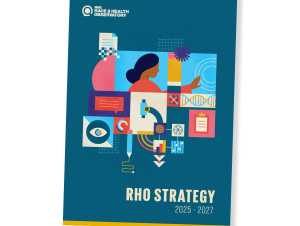Our Strategy for 2025-2027 frames more equitable healthcare with robust and co-designed ambitions for the Observatory and for the sector as a whole. All the people we’ve engaged – hundreds overall – have helped to steer us towards a set of strategic ambitions which, over the next few years, will be the focus of our collective efforts. These are the result of years of work, and we believe delivering them would make the greatest possible impact in tackling racial and ethnic inequity.
We know the healthcare system can work in a way that eliminates race inequity, and this strategy will support the system to get there.
Engagement Event to Shape Observatory’s 2025-2027 Strategy
The development of our 2025-2027 strategy involved engagement on our key ambitions and future priorities to tackle racial inequalities in health and healthcare.
This included a strategy event with key partners and stakeholders at the Royal Society of Medicine in November 2024.
The discussion panel on hand included Marie Gabriel, Chair of the NHS Race and Health Observatory; Prof Habib Naqvi, Chief Executive, Lord Victor Adebowale, Chair of the NHS Confederation and Observatory Board member; Ed Moses, Director for the NHS 10 Year Plan: Policy and Engagement at the Department of Health and Social Care, and Tracey Bignall, Director of Policy and Engagement at the Race Equality Foundation.
Watch this short highlights video of the engagement event.

